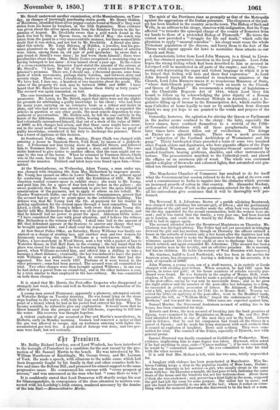Vraniurtg.
Mr. Beilby Richard Lawley, son of Lord Wenlock, has been introduced to the borough cf Pontefract as a candidate for the seat vacant by the promotion of Mr. Samuel Martin to the bench. He was introduced by Mr. William Moorhouse of Knottingly, Mr. George Green, and Mr. Leeman of York. He made a speech, with allusions to the noble cause which had been frequently fought by his family in that and other counties both before and since the Reform by ; and promised his utmost support to the same progressive cause. He commenced his canvass with "every prospect of success," and was announced as the man who had "come there to win:,
It is confidently stated that Lord Dunraven will shortly resign his scat for Glamorganshire, in consequence of the close attention to matters connected with his Lordship's Irish estates, rendered necessary by the demise of the late Earl.—Monmoutlishire
The spirit of the Provinces rises as promptly as that of the Metropolis against the aggressions of the Italian potentate. The eloquence of the pulpit has been kindled in the country as in the town. The Bishop of Bath and Wells, in an address to his clergy, observes with indignation, that the Pope affected "to transfer the episcopal charge of the county of Somerset from my hands to those of a pretended Bishop of Plymouth." He terms the contest now provoked a struggle for life and death," which calls the physician to apply "unusual remedies" : his clergy must rouse the whole Protestant population of the diocese, and hurry them to the foot of the Throne with urgent appeals for laws to neutralize these attacks on our Church and State.
A characteristic letter from Lord John Manners, to a friend in Liverpool, has obtained permissive insertion in the local journals. Lord John hopes the strong feeling which had been described to him as aroused in Liverpool will be manifested in all parts of the empire; and this, "foreseeing and deprecating the angry and violent language in which it is to be feared that feeling will here and there find expression." As Lord John Russell traces all the mischief to treacherous ministers of the Church, Lord John Manners traces it to treacherous Ministers of State, "whose Anti-Church policy invited" "such an insult to the Church and Queen of England.' He recommends a retracing of legislation— in the Charitable Bequests Act of 1844, which Lord Grey felt bound to follow up by acknowledging the prior dignity of a Roman Catholic Archbishop over Protestant Bishops in Australia ; and a legislative filling up of lima= in the Emancipation Act, which enable Roman Catholics at home legally to oust us by anticipation from dioceses which we may yet hope to see granted to the wants and prayers of the Church.
Generally, however, the agitation for stirring the Queen or Parliament in the matter seems confined to the clergy : the laity, especially the lower classes, have confined themselves to a revival of the Fifthof-November celebrations with all those paraphernalia which in later times have almost fallen out of recollection. The doings at Exeter are a splendid sample. There was a mock procession and "induction of the Cardinal Archbishop of Westminster and his gang." Thirty bareheaded friars preceded a train of some two hundred other Popish orders and dignitaries, who bore gigantic effigies of the Pope and Cardinal Wiseman, and of the Inquisitor-General surrounded by masked familiars, bearing gridirons, shackles, and other instruments of torture. The processionists marched to the Cathedral-yard, and placed the effigies on an enormous pile of wood. The whole was consumed amidst a display of fireworks and coloured lights, that astonished and gratified ten thousand spectators.
























 Previous page
Previous page